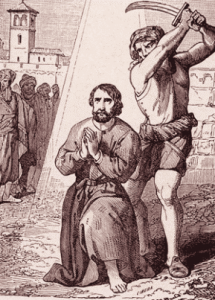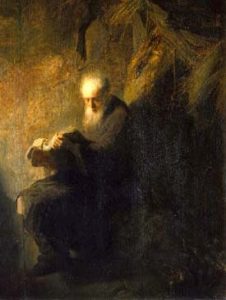 Saint Eulogius
Saint Eulogius
Martyr († 859)
Feast- March 11
In the ninth century, the Muslim conquerors of Spain made Cordoba their capital. They allowed Christians to live in relative peace. During this time, the faithful could, it is true, worship freely, and retained their churches and property on the condition of paying a tribute for every parish, cathedral, and monastery. Frequently such tribute was increased at the will of the conqueror, and often the living had to pay for the dead. Many of the faithful then fled to Northern Spain, others took refuge in the monasteries of the Sierras, and thus the number of Christians eventually shrank to small proportions. In the large cities like Toledo and Cordova, the civil rule of the Christians did not differ from that of the Visigothic epoch. The government was exercised by the comes (count), president of the council of senators, among whom we meet a similarly named ancestor of St. Eulogius.
The family of the saint was of the senatorial class and held land in Córdoba from Roman times. The saint, like his five brothers, received an excellent education in accord with his good birth among the clergy of the Church of Saint Zoilus, a martyr who had suffered with nineteen others several centuries earlier, under Diocletian and his mother Isabel. The youngest of the brothers, Joseph, held a high office in the palace of Abd-er-Rahman II. His two other brothers, Alvarus and Isidore, were merchants and traded on a large scale as far as Central Europe. Of his sisters, Niola and Anulona, they first remained with their mother; the second was educated from infancy in a monastery where she later became a nun.
It is not certain on what date or in what year of the ninth century Eulogius was born; it must have been before 819, because in 848 he was a priest highly esteemed among the Christians of Catalonia and Navarre, and priesthood was then conferred only on men thirty years of age. As a boy, St. Eulogius showed intellectual promise. The monks of the monastery of St. Zoilus educated him in the Christian and Greco-Roman classics. After completing his studies in the monastery of St. Zoilus, Eulogius continued to live with his family to better care for his mother; also perhaps, to study with famous masters, one of whom was Abbot Speraindeo, an illustrious writer of that time.
St. Eulogius’s friend and biographer Paulus Alvarus affectionately described him as gentle, reverent, well-educated, steeped in Scripture, and so humble that he freely submitted to opinions of others less informed than he. He said that St.Eulogius had a pleasant demeanor and conducted his relationships with such kindness that everyone regarded him as a friend. A gifted leader, the most prominent among his charisma was the ability to give encouragement. As a priest serving in an occupied country, he used this gift to strengthen his friends in the face of danger.
He distinguished himself, by his virtue and quickly emerged as a leader among Mozarabic Christians.
Without ever weakening, St. Eulogius, who was a priest and head of the principal ecclesiastical school at Cordova, combated the perverse influence of the invaders, and it is primarily because of him that the Church saw a new and magnificent flowering of victims immolated for the faith, later to be the source of great blessings for Spain. St. Eulogius recorded the names and acts of these generous martyrs.
When Abd-er Rahman II became Emir of Córdoba in 822, there came a change in the attitude of the Arab rulers. While Muslims enjoyed the freedom to worship and to make converts, Christians who evangelized Muslims or made disparaging remarks about Muhammad could be executed. In 850 the Muslims imprisoned the bishop and priests of Cordoba, including St.Eulogius. In jail, the saint read the Bible to his companions and encouraged his fellow prisoners to remain faithful to Christianity. He addressed his Exhortation to Martyrdom to two young women he knew in prison. They were threatened with sexual slavery unless they renounced the faith: “Cowardly Christians will tell you in order to shake your constancy that the churches are silent, deserted and deprived of the sacrifice on account of your obstinacy: that if you will but yield temporarily you will regain the free exercise of your religion. But be persuaded that, for you, the sacrifice most pleasing to God is contrition of heart, and that you can no longer draw back or renounce the truth you have confessed.” The girls, named Flora and Mary, were in fact spared violation, and instead on the 24th of November 851 were beheaded by the sword. Six days later, the Umayyad authorities released St. Eulogius and his fellow prisoners from captivity. In the year 852 several others suffered the same martyrdom. St. Eulogius encouraged these martyrs, too, for their triumphs, and was the support of the distressed flock.
When the Archbishop of Toledo died in 858, the clergy and people of Toledo elected Eulogius bishop; he was never installed in that see. His past made him objectionable to the caliph, who monitored episcopal elections. The caliph’s officials knew not only that St. Eulogius had earlier advised imprisoned Christians, but that he had also hidden a young girl, a virgin, by name Leocritia, of a wealthy governing family of Moors, instructed from her infancy in the Christian religion by one of her relatives, and privately baptized. Like many Muslim girls who are abused today for having non-Muslim friends, Leocritia’s parents beat her cruelly to compel her to return to the Muslim religion. Having made her situation known to St. Eulogius and his sister, adding that she desired to go where she might freely exercise her religion, they secretly procured for her means of escaping, and concealed her for some time among faithful friends. She was found out, however, and all those who had helped her were brought before the Muslim magistrate who threatened to have Eulogius scourged to death. The Saint told him that his torments would be of no avail, for he would never change his religion; continuing, he exposed vigorously the impostures and errors of the Muslim religion and exhorted the judge to become a disciple of Jesus Christ, the unique Savior of the world. At this, the judge gave orders that he be taken to the palace and be presented before the king’s council. St. Eulogius denounced Muhammad as a false prophet, and boldly proposed the truths of the Gospel to these officials. But in order not to hear him, the council condemned him immediately to be decapitated. As they were leading him at once to execution, one of the guards gave him a blow on the face for having spoken against the prophet Mahomet; he turned the other cheek, and patiently received a second. He received the stroke of death with great cheerfulness, on the 11th of March, 859. St. Leocritia was beheaded four days afterwards, and her body thrown into the Guadalquivir River, but salvaged for burial by the Christians.
St. Eulogius left a perfect account of the orthodox doctrine which he defended, the intellectual culture which he propagated, and the imprisonment and sufferings which he endured. His writings show that he followed to the letter the exhortation of St. Paul: Imitatores mei estote sicut et ego Christi.
He is buried in the cathedral of Oviedo.
References and Excerpts
[1] “CATHOLIC ENCYCLOPEDIA: Eulogius of Cordova.” [Online]. Available: http://www.newadvent.org/cathen/05604a.htm. [Accessed: 14-Mar-2018].
[2] “Saint Eulogius, Martyr.” [Online]. Available: http://sanctoral.com/en/saints/saint_eulogius.html. [Accessed: 14-Mar-2018].
[3] “Eulogius of Córdoba,” Wikipedia. 04-Jan-2018.
 Smoke of Satan in the Church – Part 5
Smoke of Satan in the Church – Part 5